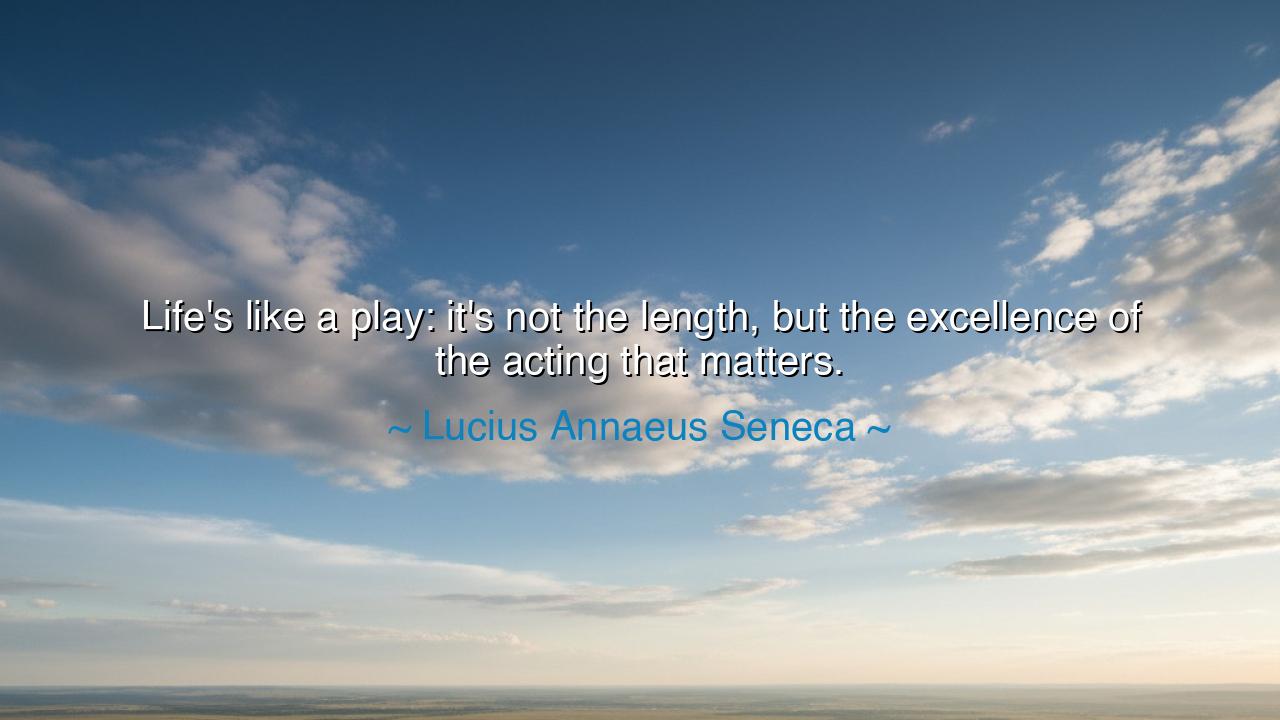
Life's like a play: it's not the length, but the excellence of
Life's like a play: it's not the length, but the excellence of the acting that matters.






“Life’s like a play: it’s not the length, but the excellence of the acting that matters.” Thus spoke Lucius Annaeus Seneca, the Stoic philosopher, statesman, and teacher of emperors, whose words echo across the centuries with the calm strength of a man who had looked death in the eye and did not tremble. In this simple image—the stage, the actor, the play—he captured the very essence of Stoic wisdom, the art of living well even in a world beyond our control. For Seneca knew that life cannot be measured by years alone; its worth is found in how we live, not how long we live. To him, the excellence of life, like the excellence of an actor’s craft, lies in the grace, courage, and integrity with which one performs their part upon the stage of existence.
Seneca’s words were born not from comfort, but from hardship. He lived under the shadow of tyrants and exile, serving as an advisor to Emperor Nero, whose cruelty and madness would eventually turn against him. Knowing the fragility of fortune, Seneca sought not to escape the brevity of life, but to understand it, to embrace it without fear. To him, death was not tragedy but conclusion—like the fall of the curtain after a noble performance. What mattered was not whether the play was long or short, but whether it was played with virtue, purpose, and dignity. In this way, Seneca turned the inevitability of mortality into a source of strength, teaching that the wise man finds freedom not in endless years, but in mastery of the moment.
The metaphor of the stage was dear to the Stoics, who believed that each person is an actor in a drama written by the gods or by fate. We do not choose our roles—whether we are kings or beggars, loved or forgotten—but we choose how to play them. As Epictetus, another Stoic sage, would later say, “Remember that you are an actor in a play, of whatever kind the playwright chooses.” Some are given long roles, others short; some play heroes, others villains; but all are judged by the same measure: Did you play your part well? Seneca reminds us that the quality of the soul is not in the abundance of time, but in the excellence of conduct.
Consider the story of Alexander the Great, who conquered much of the known world before dying at the age of thirty-two. His life was brief, but his actions reshaped history. He lived intensely, burning with vision and courage. Contrast this with those who live long yet drift aimlessly, consumed by fear, greed, or indifference. Who among them truly lived? The answer, Seneca would say, lies not in the counting of days, but in the greatness of spirit with which one fills them. It is not the number of breaths that marks a life, but the fire that burns within each one.
Seneca’s wisdom also carries within it a quiet defiance of death itself. For the one who lives nobly need not fear an early end. “What difference,” he asks elsewhere, “does it make how soon you depart, if you depart complete?” The man who lives rightly has already achieved immortality of the soul, for his deeds, his words, and his virtue outlast his flesh. The coward clings to time as though it were life itself, but the wise man knows that time is nothing without meaning. The excellence of the actor gives glory to even the briefest scene, while mediocrity makes eternity dull.
This teaching is not only for philosophers or heroes; it is for all who walk the path of mortal life. Each of us is an actor upon the stage of our days, performing before the silent gaze of eternity. Some scenes are joyous, others full of sorrow. The script may twist in ways we do not expect. Yet in every moment, we can choose excellence—kindness in hardship, courage in uncertainty, serenity in loss. To live with virtue is to give one’s best performance before the curtain falls. And when it falls, the wise do not lament its closing, for they know they have played their part well.
So, my child of the fleeting hour, take this counsel into your heart: seek not length of days, but depth of living. Do not chase endless tomorrows, for they are not yours to command. Instead, fill today with purpose, with gratitude, with compassion. If your life is but a single act, let it shine with brilliance; if it is long, let every chapter be worthy of remembrance. Measure your worth not by time’s duration, but by your integrity, your courage, your love. For life, like the theater, is not judged by how long the play endures—but by how truly, how beautifully, and how nobly it was performed.
Thus, Seneca’s wisdom endures: “It’s not the length, but the excellence of the acting that matters.” Let your life, then, be your finest art. Act it with sincerity, with strength, and with peace—so that when your final curtain falls, the world may say, not “He lived long,” but “He lived well.”






AAdministratorAdministrator
Welcome, honored guests. Please leave a comment, we will respond soon